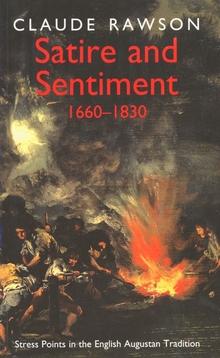Satire and Sentiment, 1600–1830
WARNING
You are viewing an older version of the Yalebooks website. Please visit out new website with more updated information and a better user experience: https://www.yalebooks.com
Stress Points in the English Augustan Tradition
Claude Rawson
“Rawson is himself an Augustan among critics, expressing worlds of scholarship with a pungent and delightful humanism.”—Donald Lyons, New Criterion
“A luxuriant hybrid of keen literary criticism and well-documented cultural history. . . . This ranging synthesis of a reeling world is mind-expanding for critics and historians, specialists and generalists.”—Kenneth Craven, Scriblerian
“Rawson’s book shows that there is considerable life and interest left in relatively traditional literary history.”—Charles A. Knight, Eighteenth-Century Studies
“Rawson marshals an army of erudite references from Statius to Mailer to illuminate the major figures: Swift, Pope, Burke, Byron, and Shelley. His conversational style is wide-ranging in the best Augustan essay-mode.”—Laura L. Runge, Albion
Claude Rawson is Maynard Mack Professor of English at Yale University.
"Rawson has been our most sensitive, and surely most eloquent, reader of satire, especially attuned to Swift's lucubrations in their various modulations and crescendos. Here he yokes 'satire' to 'sentiment' on grounds that sense and sensibility cannot mix must think twice after reading Rawson."—George Rousseau, Literature and History
"Rawson displays the competence and expertise of a classical scholar, whether dealing with . . . the cruel laughter of victors at the dismemberment of their victims, or the effect new weapons (such as gunpowder) or new technology have on traditional values and standards and their epic representation."—C. J. Classen, International Journal of the Classical Tradition
"Claude Rawson has been called 'one of the few very best critics and scholars of eighteenth-century English literature, sharp, subtle, learned, and ready to relate his specialist interests to human experience at large.'"—Howard Erskine-Hill, Review of English Studies
"At his best, Rawson is among the most sensitive and illuminating of critics . . . urbane, allusive and finely nuanced . . . his critical discrimination is first-rate."—David Nokes, Times Literary Supplement
"18th-century English studies were long plagued by a blinkered backward-lookingness that attributed to the age an uninteresting 'neoclassicism,' a left-over 'humanism,' or a merely conventional religious orthodoxy. If we have largely got over such stuff, Rawson's work . . . has a lot to do with it. In the long run Rawson heeds the things that matter most."—W.B. Carnochan, London Review of Books
"Claude Rawson is one of the preeminent living interpreters of the 'Augustan' tradition in English literature. . . . His career has combined elements not commonly found in the same writer—a lively and opinionated critical mind, and a methodical and learned scholar."—Dustin Griffin, Essays in Criticism
"The virtues of this lie precisely in Rawson's capacity to seize on . . . details and demonstrate how they illuminate the ambiguities of the life of letters in the Georgian era. Lively, erudite and witty, this is an ideal book to browse, savor and quarrel with."—Roy Porter, Archives
"An astounding display of rare and truly admirable erudition. . . . Stunning insight. . . . Amazing breadth of reading."—Joel Weinsheimer, Journal of English and German Philology
"There is depth of scholarship here, enviable sensitivity in reading, and over and over again the cross-reference, to Vietnam, to the Gulf War, that betrays the truly alert critical mind . . . illuminating one of the most significant shift of sensibility in our recent cultural history."—Allan Ingram, Yearbook of English Studies
Publication Date: May 11, 2000


